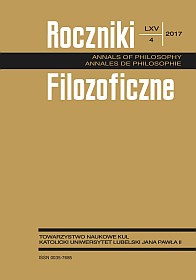How Two Become One? Pavel Florensky’s Concept of Identity
Abstract
Pavel Florensky attempted to formulate an ontological theory of love. He believed that love is not merely a psychological phenomenon but also implies a kind of real unification. Florensky proposed to understand the latter in terms of consubstantiality. Two numerically distinct subjects might become one in virtue of their numerically identical essence. Besides that Florensky sketched an ontological theory based on the distinction between things and persons. It seems that he held a bundle theory of objects, a trope nominalism for things, and a substrate theory combined with realism for persons. Florensky’s view might be therefore taken as a position in the debate on the principle of the identity of indiscernibles. Finally, I suggest that the serious philosophical and theological problems of Florensky’s ontology of love might be overcome by adding to his theory the patristic distinction between essence and energies.
References
Armstrong, David M. Universals and Scientific Realism. T. 1: Nominalism and Realism. Cambridge: Cambridge University Press, 1978.
Augustyn, św. O Trójcy Świętej. Tłum. Maria Stokowska. Kraków: Znak, 1996.
Black, Max. „Zasada identyczności rzeczy nieodróżnialnych”. Tłum. Marcin Iwanicki. Roczniki Filozoficzne 55 (2007), nr 1: 285–296.
Florenski, Paweł. Filar i podpora prawdy. Próba teodycei prawosławnej w dwunastu pismach. Tłum. Jacek Chmielewski. Warszawa: KR, 2009.
Kripke, Saul. „Identyczność a konieczność”. Tłum. Tadeusz Szubka. W: Metafizyka w filozofii analitycznej. Red. Tadeusz Szubka, 95–125. Lublin: TN KUL, 1995.
Leibniz, Gottfried Wilhelm. „Wyznanie wiary filozofa”. Tłum. Juliusz Domański. W: Wyznanie wiary filozofa. Rozprawa metafizyczna. Monadologia. Zasady natury i łaski oraz inne pisma filozoficzne, 3–56. Warszawa: PWN, 1969.
Loux, Michael J. Substance and Attribute: A Study In Ontology. Dordrecht: Reidel, 1978.
Лурье, Василий [Lur’e, Vasiliy], „Послесловие [Posleslovie]”. W: Иоанн Мейендорф [Ioann Meyendorf]. Жизнь и труды святителя Григория Паламы. Введение в изучение [Zhizn’ i trudy svyatitelya Grigoriya Palamy. Vvedeniye v izucheniye], 327–361. Санкт-Пeтeрбург: Византинороссика [Sankt-Peterburg: Vizantinorossika], 1997.
Моисеев, В[ячеслав] И[ванович] [Moiseyev, Vyacheslav Ivanovich]. Логика всеединства [Logika vseyedinstva]. Москва: Пeр Сe [Moskva: Per Se], 2002.
Moreland, James. P. Universals. Chesham: Acumen, 2001.
Rojek, Paweł. „Filar i podpora prawdy jako lekarstwo na melancholię”. Christianitas 44 (2010): 302–316.
Rojek, Paweł. „The Logic of Palamism”. W: Logic in Orthodox Christian Thinking. Red. Andrew Schumann, 38-80. Hausenstamm: Ontos Verlag, 2013.
Rojek, Paweł. „Rosyjski projekt filozofii teologicznej”. W: Rosyjska metafizyka religijna. Red. Teresa Obolevitch i Wojciech Kowalski, 23–44. Tarnów: Biblos, 2009.
Rojek, Paweł. „Intellectus quaerens fidem: Georges Florovsky on the Relation between Philosophy and Theology”. Roczniki Filozoficzne 64 (2016), nr 4: 147–163.
Slesinski, Robert. Pavel Florensky: A Metaphysics of Love. Crestwood: St. Vladimir’s Seminary Press, 1984.
Vaenius, Otto. Amoris divini emblemata. Antverpiae: Officina Martini Nuti et Ioannis Meursi, 1615.
Copyright (c) 2017 Roczniki Filozoficzne

This work is licensed under a Creative Commons Attribution-NonCommercial-NoDerivatives 4.0 International License.





